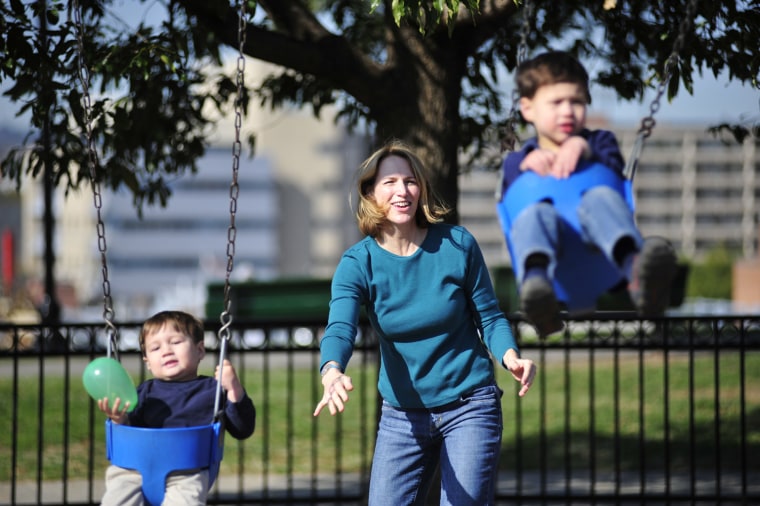I was busy tailing my 18-month-old and 3-year-old boys around the playground that afternoon, so at first I didn’t notice the nannies chatting on the bench. But I gradually realized that, for most of an hour, as the nannies talked and laughed, they weren’t watching their little ones.
One toddler picked up a dirty food wrapper off the ground. He was about to pop it into his mouth when I stopped him. Another toddler who needed a steadying hand clambered awkwardly, alone, over a concrete barrier and fell hard on the sidewalk. Later, she began running full-speed at the swing set, where I was pushing one of my boys. I managed to grab her before she got conked on the head.
“She could have gotten hurt,” I instinctively yelled over to the nanny group.
Walking home, I mulled it over. I didn’t know the families. I didn’t know the nannies. I’d only seen them for a few hours. Maybe they were terrific most of the time. There are certainly many wonderful nannies. Maybe it was none of my business. Who was I to say something to the parents?
But shouldn’t someone say something?
It’s a common dilemma, and a heated one. And with the Internet, there are more ways than ever to report on those nannies, with websites like I Saw Your Nanny posting dozens of sightings of bad care.
After finding out that my husband had seen the same type of care, and hearing that other parents had nicknamed these nannies “the benchwarmers,” because they rarely got off the bench, I decided I should do something. It seemed like a safety issue. Besides, I told myself, if the situation were reversed, I would want someone to tell me.
Through the neighborhood’s email group, I found the parents. I wrote them a short note saying I’d seen their nannies with their children and wanted to pass along some information. I wasn’t sure what I expected, but I was surprised when they cut me off before I could tell them what happened.
“I’m completely comfortable with the level of supervision of our nanny,” one mom said in her curt email reply. The other mom wrote that the nanny had been in their family for years. End of conversation.
The “I saw your nanny” conversation is always emotionally charged because even if women think that there’s nothing wrong with having a nanny, on some level, many still feel guilty that they’re not at home with their child, said Dr. Gail Saltz, a psychiatrist and TODAY contributor. She noted that mothers spend hours and hours trying to find the right caregiver. They’ve bonded with that person and invested in her.
“They have chosen all this time to allow their most precious thing to be under the care of this person,” Saltz said, “and so if you saying they’re not providing good care, in a sense, they feel their own mothering is being personally attacked.”
And it's hard to know when to speak up. Families have different child-rearing philosophies, so what's right -- or wrong -- for one parent may not be for another. Anyone, whether nanny or mother, can get distracted or just have a bad afternoon.
"Everybody makes mistakes, mothers make mistakes,” Saltz added. “That a nanny would make a mistake does not mean that she’s a bad nanny necessarily. But it might.”
As an expert and a mother of three, her criteria for reporting it to another mother are simple: if it’s egregious, if it’s a safety issue, or if it were something you would want to know yourself.
“Many mothers say to me this happened, and they’re torn about what to do, or how to feel,” Saltz said.
Saltz has experienced both sides. Years ago, when her kids were younger, she approached two of her friends when she saw problems with their nannies: one listened and thanked her. The other mother told her she had misread the situation and didn’t believe her.

Then the day arrived when someone reported a problem to Saltz, telling her that her own nanny wasn’t picking up her daughter when she cried. Saltz discussed it with the nanny and discovered something important: they had different philosophies. The nanny believed in self-soothing; Saltz wanted her baby girl picked up. The nanny agreed to do it the way Saltz wanted it – only later, her friend once again saw the nanny letting the child cry. Saltz let the nanny go.
Turnabout came for me a few months after I’d reported those nannies at the park. A friend said that while my babysitter was trying to get the stroller out the front door, both of my boys had bolted halfway down the block. My first reaction was to feel judged – and defensive of the woman I’d hired.
I talked with my babysitter, and we wound up identifying a new problem with my younger son – that when he saw a chance, he was beginning to just run off. We came up with a different routine for leaving the house, and my son was safer.
I wonder sometimes if I was too forward in contacting mothers I didn’t know, or if maybe days or weeks later, my emails prompted a similar conversation with their nannies. I know that, for me, even though it was a little unsettling, I was grateful someone spoke up. In the big world out there, we all need to watch out for each other, and for our kids.
Diana K. Sugg is a Pulitzer Prize-winning journalist who has covered medicine, crime and other issues for newspapers around the country. She is now a freelance writer in Baltimore raising two young sons.